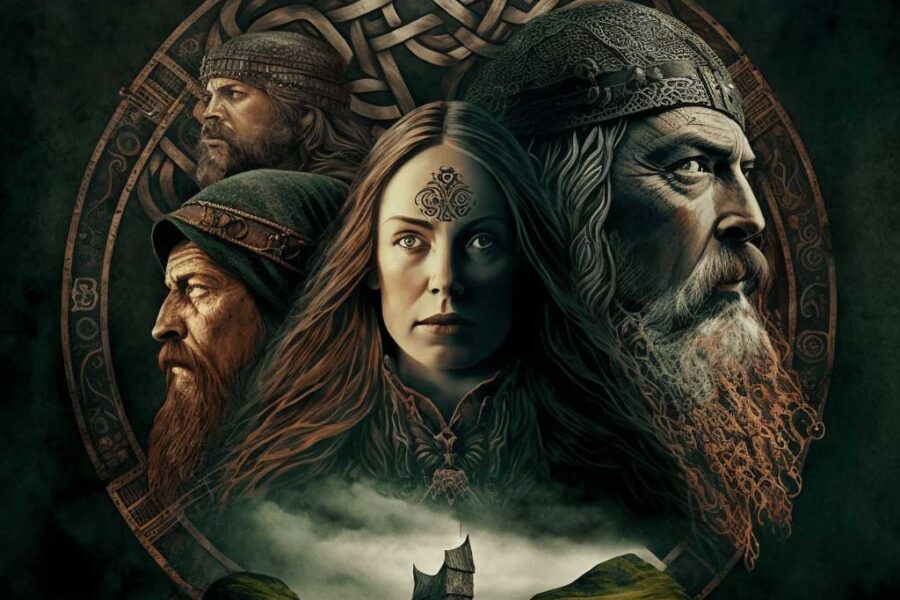The Celtic civilization boasts a prodigious past dating back to the Iron Age. The Celtic tribes spanned the European continent and left an indelible mark on the local cultures, languages, and traditions. Each tribe, from the gallant warriors of Gaul to the creative and melodious Celts of Ireland, possessed distinctive qualities that defined them. This article will delve into the various Celtic tribes of Europe, their origins, and the legacy they have bequeathed.
The Gauls: Champions of Ancient France
The Gauls constituted a formidable Celtic tribe that occupied current-day France, Belgium, and parts of Switzerland and Germany. They were reputed for their gallantry and military prowess and were frequently depicted as ferocious combatants by the Romans. The Gauls were fractionated into several tribes, each with its own chieftains and territories. One of the most distinguished Gaulish tribes was the Arverni, who were led by Vercingetorix, the hero who heroically battled Julius Caesar during the Gallic Wars.
Despite their reputation as warriors, the Gauls were also highly skilled in agriculture, metalworking, and craftsmanship. They cultivated a refined culture and excelled in the arts, such as ceramics, weaving, and jewelry crafting. The Gauls were renowned for their religious beliefs, which encompassed the veneration of gods and goddesses like Mars, Mercury, and Jupiter, as well as a profound respect for the druids, who acted as their priests and advisors.
Britons
The Britons were a Celtic tribe that inhabited current-day England and Wales. They were known for their profound oral tradition and their aptitude for poetry, storytelling, and music. The Britons were a proud people who resisted Roman hegemony and maintained their Celtic language and traditions long after the fall of the Roman Empire.
One of the most distinguished Britons was Boudica, the warrior queen who led a revolt against the Roman occupation of Britain. Despite her eventual defeat, Boudica remains an emblem of British resistance and independence to this day.
The Britons also upheld a rich religious tradition, which included the veneration of gods and goddesses such as Sulis, Nodens, and Cerridwen. They also believed in the druids, who acted as their priests and advisors.
Iberians
The Iberians were a Celtic tribe that occupied current-day Spain and Portugal. They were reputed for their sophisticated and advanced civilization, which encompassed impressive engineering feats, such as the construction of colossal stone monuments and fortifications. The Iberians also excelled in metalworking, crafting intricate jewelry and weaponry.
The Iberian Celts were a deeply spiritual people who worshipped a pantheon of gods and goddesses and believed in the power of the druids. They had a profound oral tradition, which incorporated tales of heroes, gods, and mythical creatures.
The Irish Celts: Keepers of Druidic Tradition
The ancient Irish were renowned for their druidic priests, who acted as powerful spiritual leaders in society. The druids were experts in nature and the natural world, as depicted in various forms of Celtic art. They played crucial roles in society, serving as educators, judges, and historians.
The Irish Celts were a tribe that inhabited the island of Ireland. They were renowned for their fondness for music, storytelling, and the arts, and their refined culture continues to inspire the world today. The Irish Celts were skilled in metalworking, weaving, and ceramics, and their religious beliefs incorporated the veneration of gods and goddesses such as the Morrigan, Brigid, and Lugh.
The Irish Celts were also renowned for their love of nature and the beauty of the natural world. They believed in the power of the land and the sanctity of the natural world and their religious beliefs and practices reflected this reverence.
The Picts: Masters of Symbolism
The Picts resided in ancient Scotland and are renowned for their intricate and striking body art. Their symbols and motifs have been discovered on a range of objects, including stones and jewelry, and were believed to have had both religious and secular applications.
The Welsh: Poets and Storytellers
The ancient Welsh were renowned for their profound oral tradition and their fondness for poetry and storytelling. Welsh mythology is steeped in tales of magic and heroism, many of which have been passed down through the generations. The tradition of Welsh bardic poetry is celebrated at festivals and events throughout Wales.
Conclusion
Each Celtic tribe had its own distinctive customs and practices, from the gallant warriors of Gaul to the druidic priests of Ireland. Their rich cultural heritage can still be explored today through the art, artifacts, and structures they left behind. While Celtic tribes may be long gone, their stories and traditions continue to live on in the cultures of their respective regions.
Recommended Reading
- “Celtic Britain” by Peter Berresford Ellis. This book is a comprehensive and highly readable history of the Celtic people in Britain, covering the period from ancient times to the present day.
- “The Celts: A History” by Peter Berresford Ellis. This book explores the history, culture, and society of the Celts, from their origins to the present day, providing a comprehensive overview of the Celtic world.
- “The Celts: A Very Short Introduction” by Barry Cunliffe. This book provides a concise and accessible introduction to the history and culture of the Celts, and explores the ways in which their legacy has been passed down to the present day.
- “The Celts: An Illustrated History” by John T. Koch and John Carey. This beautifully illustrated book provides a detailed overview of the history and culture of the Celts, with a particular emphasis on their art, archaeology, and mythology.
- “The Oxford Illustrated History of Prehistoric Europe” by Barry Cunliffe. This book covers the prehistory of Europe, including the Celtic tribes and their culture, society, and art.
- “Celtic Warriors: The armies of one of the first great peoples in Europe” by Simon James. This book covers the history and warfare tactics of various Celtic tribes and how it influence Europe.







